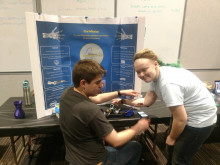Kelly Hovinga
Posts by Kelly Hovinga

On February 7th, the Shapiro Design Lab and the University of Michigan Prosthetics Club participated in the Emerson School Science Fair. Emerson School is a private K-8 institution with a dedicated staff and over 150 students. The theme for the science fair was "Problem Solvers: Using the Design Thinking Process to Find Solutions for Everyday Problems." Of the 150 students, the majority of them participated in the Fair. Projects ranged from 3rd grade mechanical card dealers, to a student in the 8th grade that created an AI that mapped cities for disaster relief. The Science Fair stretched from the school gym, through the halls, and into the large auditorium. The large auditorium is where the Shapiro Design Lab found itself tabling.
•
Have you ever sat before your computer late at night and giggled in glee as you blended layers in an imaging editing software? If not, that is probably a good thing. However, as of this week, I can proudly say that I have.
Through my job at the Shapiro Design Lab, I have access to Lynda.com, a professional training service . A subsidiary of Linkedin, Lynda contains a plethora of training materials, including an introductory course to GIMP (General Image Manipulation Program). GIMP is an open source, free image editing software that allows for high quality photo editing and image creation. Although Adobe suite programs like Photoshop are more powerful, GIMP is an excellent option for dabblers, such as myself. Moreover, many of the functions in GIMP have analogues in Photoshop, making the software great for individuals who are trying to learn but aren’t quite ready to shell out the cash. Taking the Lynda training course on GIMP was an enlightening experience—one I would suggest to others.
Through my job at the Shapiro Design Lab, I have access to Lynda.com, a professional training service . A subsidiary of Linkedin, Lynda contains a plethora of training materials, including an introductory course to GIMP (General Image Manipulation Program). GIMP is an open source, free image editing software that allows for high quality photo editing and image creation. Although Adobe suite programs like Photoshop are more powerful, GIMP is an excellent option for dabblers, such as myself. Moreover, many of the functions in GIMP have analogues in Photoshop, making the software great for individuals who are trying to learn but aren’t quite ready to shell out the cash. Taking the Lynda training course on GIMP was an enlightening experience—one I would suggest to others.
•
The U-M Library’s Shapiro Design Lab and the U-M Museum of Natural History are happy to announce a new Community and Citizen Science Project Incubator program for University of Michigan faculty, staff, and students! Community and citizen science projects can help scientists conduct extensive, quality research while engaging with members of their community. The program will explore questions about project design, ethics, learning goals, and data management. Participants will create project prototypes for their own research and community engagement, and develop the skills needed for successful projects.